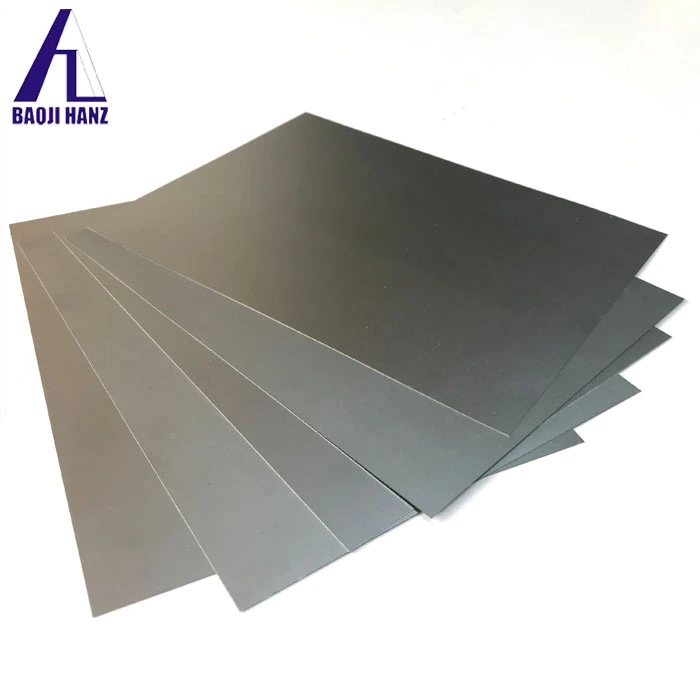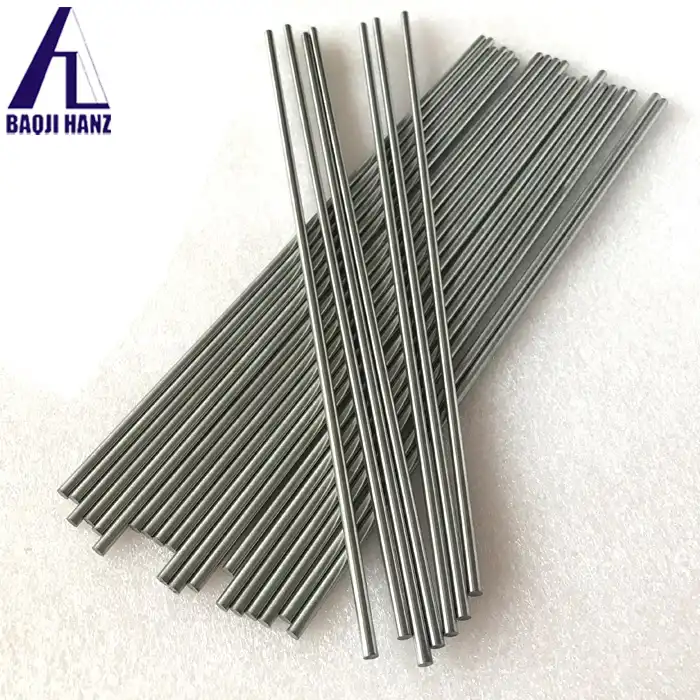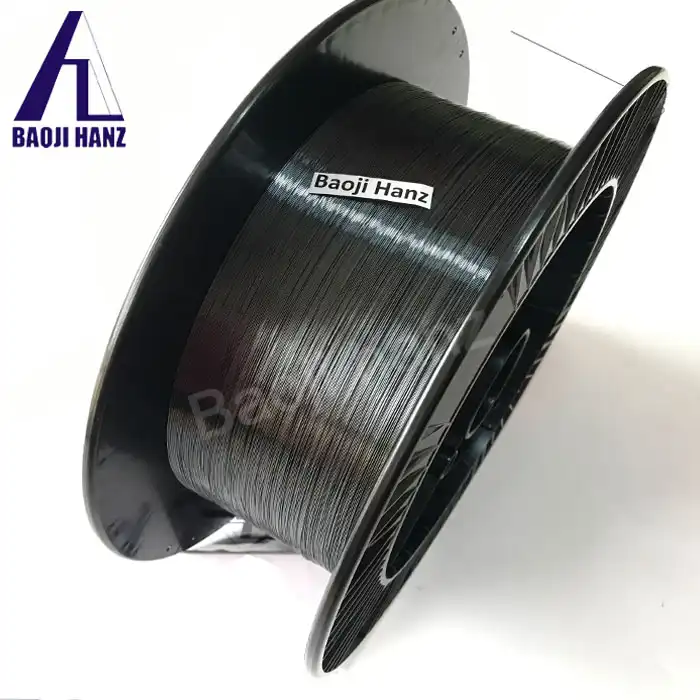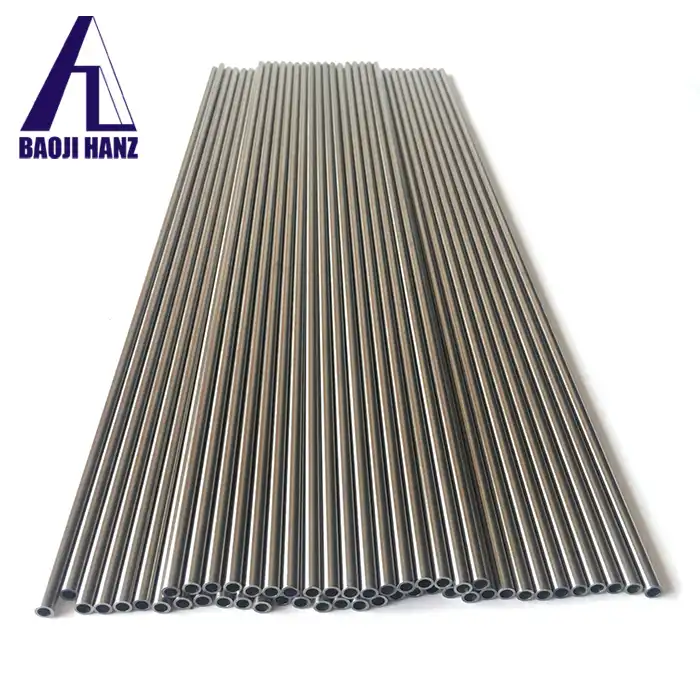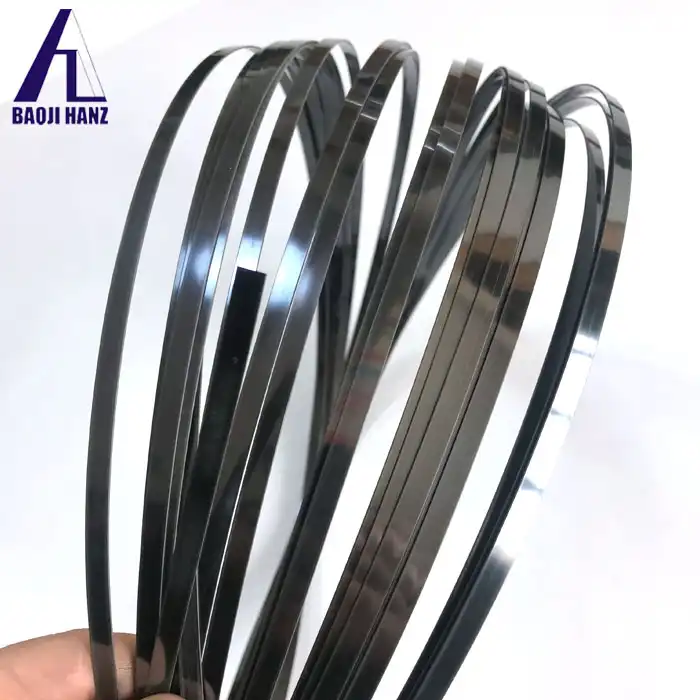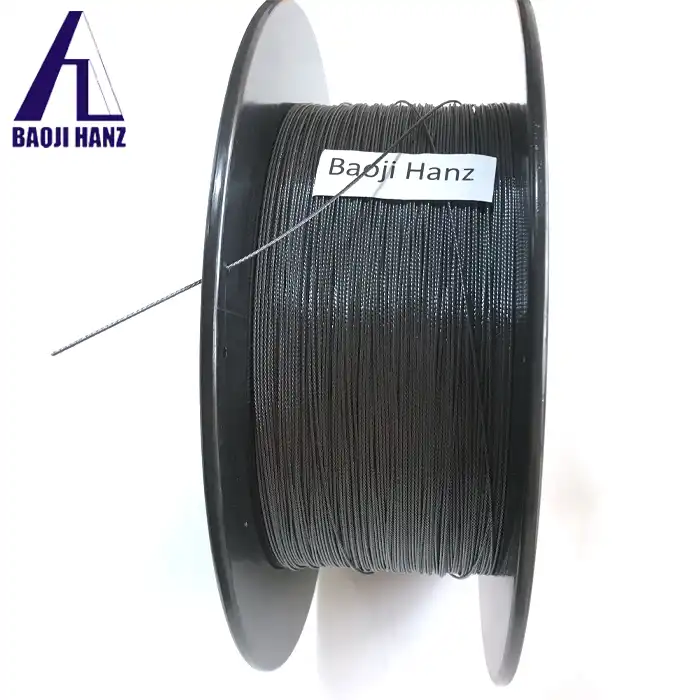What Are the Key Properties of Nickel-Titanium Alloy Strands?
2025-04-29 18:03:18
Nickel-Titanium Alloy Strands, commonly known as Nitinol strands, represent a remarkable advancement in metallurgical engineering, offering a unique combination of properties that make them invaluable across numerous industries. These extraordinary alloy strands combine nickel and titanium in near-equiatomic composition to deliver exceptional performance characteristics including shape memory effect, superelasticity, biocompatibility, and corrosion resistance. The versatility of Nickel-Titanium Alloy Strands enables applications ranging from medical devices and aerospace components to automotive systems and industrial equipment. With customizable diameters from 0.1mm to 5mm and operating temperature ranges from -50°C to 100°C, these alloy strands provide engineers and manufacturers with reliable, high-performance material solutions that can transform under specific conditions while maintaining structural integrity.

Fundamental Properties of Nickel-Titanium Alloy Strands
Shape Memory Effect
The shape memory effect stands as one of the most fascinating properties of Nickel-Titanium Alloy Strands. This remarkable characteristic allows the material to "remember" and return to its pre-deformed shape when heated above its transformation temperature. This phenomenon occurs due to the unique crystalline structure transition between martensite and austenite phases. When in its lower temperature martensite phase, Nickel-Titanium Alloy Strands can be easily deformed, but upon heating above the transition temperature, the material transforms to the austenite phase, reverting to its original shape with considerable force. This property makes Nitinol strands invaluable in applications requiring controlled, predictable movement in response to temperature changes. The shape memory effect in these alloy strands can be precisely engineered during manufacturing through careful control of composition and processing parameters, allowing Baoji Hanz Metal Material Co., Ltd. to produce strands with transformation temperatures tailored to specific application requirements. With transformation ranges customizable between -50°C and 100°C, these Nickel-Titanium Alloy Strands offer engineers remarkable design flexibility for creating temperature-activated mechanisms in medical devices, robotic systems, and aerospace applications where conventional materials would fail to provide the necessary functional characteristics.
Superelasticity
Superelasticity represents another extraordinary property of Nickel-Titanium Alloy Strands, allowing them to undergo substantial deformation—up to 8-10% strain—and return to their original shape upon unloading without permanent damage. This characteristic vastly exceeds the elastic limits of conventional metals, which typically deform permanently beyond 1% strain. The superelastic behavior occurs when the material is above its austenite finish temperature, where mechanical stress induces a reversible phase transformation from austenite to stress-induced martensite. When the stress is removed, the material automatically reverts to austenite and recovers its original shape. Baoji Hanz's high-grade Nickel-Titanium Alloy Strands demonstrate exceptional fatigue resistance, capable of enduring thousands of loading-unloading cycles while maintaining their superelastic properties. This remarkable durability makes them ideal for applications requiring repeated deformation without failure or performance degradation. The consistent mechanical behavior of these alloy strands across their operational lifespan provides engineers with reliable performance in demanding environments. Applications leveraging this property include medical guidewires, orthodontic archwires, eyeglass frames, and various industrial components that must withstand significant deformation while maintaining their original geometry and functionality after the deforming force is removed.
Biocompatibility
Biocompatibility stands as a critical property of Nickel-Titanium Alloy Strands, particularly for medical applications where direct contact with human tissue occurs. Despite containing nickel, which can potentially cause allergic reactions, properly manufactured Nitinol strands develop a stable titanium oxide surface layer that effectively shields the body from nickel exposure. This protective oxide film gives the material excellent compatibility with biological systems, making it suitable for implantable medical devices. Baoji Hanz Metal Material Co., Ltd. produces Nickel-Titanium Alloy Strands that meet rigorous international standards, including ISO 13485:2016 for medical device manufacturing, ensuring consistent quality and safety for medical applications. The company's manufacturing processes, including specialized heat treatments and surface finishing techniques, optimize the biocompatibility of these alloy strands by minimizing nickel leaching while enhancing corrosion resistance. This makes them ideal for long-term implantable devices such as vascular stents, where the material must perform reliably within the human body for years without adverse reactions or degradation. The combination of biocompatibility with mechanical properties like superelasticity creates a unique material solution for medical devices that must conform to complex anatomical structures while remaining biocompatible, allowing for minimally invasive procedures and improved patient outcomes across a wide range of therapeutic applications.
Applications and Performance Characteristics
Medical Device Applications
In the medical field, Nickel-Titanium Alloy Strands have revolutionized device design and functionality through their unique combination of properties. Vascular stents represent one of the most significant applications, where the superelastic nature of these alloy strands allows for compression into a catheter for minimally invasive delivery, followed by automatic expansion when deployed in blood vessels. This self-expanding capability eliminates the need for balloon expansion used with conventional stents, reducing vessel trauma and improving long-term outcomes. Baoji Hanz Metal Material Co., Ltd. produces medical-grade Nickel-Titanium Alloy Strands with diameters as small as 0.1mm, providing the precision necessary for intricate medical applications while maintaining consistent mechanical properties. Beyond stents, these alloy strands are utilized in guidewires that navigate complex vascular pathways, orthodontic archwires that apply gentle, continuous force for tooth movement, and surgical instruments that combine flexibility with durability. The company's ISO 13485:2016 certification ensures that their Nickel-Titanium Alloy Strands meet the stringent quality requirements for medical devices, while their advanced manufacturing processes deliver consistent performance characteristics across production batches. The non-ferromagnetic nature of these alloy strands also makes them compatible with MRI environments, adding another advantage for implantable medical devices. As medical procedures continue to advance toward less invasive approaches, the demand for Nickel-Titanium Alloy Strands with customized properties continues to grow, driving innovation in both material development and medical device design.
Aerospace and Automotive Applications
The extreme environmental conditions and weight considerations in aerospace and automotive industries make Nickel-Titanium Alloy Strands an ideal material for numerous critical applications. In aerospace, these alloy strands are employed in hydraulic tube couplings that utilize the shape memory effect to create leak-tight seals when heated during installation. The temperature range capability from -50°C to 100°C ensures reliable performance across the extreme temperature variations encountered in aerospace environments. Actuators made from Nickel-Titanium Alloy Strands provide mechanical movement in response to temperature changes, creating simple, reliable control mechanisms without complex electronic systems. Baoji Hanz Metal Material Co., Ltd. supplies customized alloy strands for vibration damping components that absorb mechanical energy through stress-induced phase transformations, protecting sensitive equipment from damage during launch and operation. In automotive applications, these alloy strands find use in thermal actuators for climate control systems, where their temperature-responsive nature provides precise mechanical movement without electrical components. Engine management systems also benefit from Nickel-Titanium Alloy Strands in applications like variable flow control valves that respond to engine temperature changes, optimizing fuel efficiency and performance. The company's extensive experience in customizing alloy compositions allows them to provide strands with transformation temperatures precisely tailored to specific automotive operating conditions. The exceptional fatigue resistance of these alloy strands, capable of withstanding thousands of transformation cycles without degradation, makes them particularly valuable in applications requiring long-term reliability under repeated thermal or mechanical cycling conditions in both aerospace and automotive sectors.
Industrial Equipment Applications
The industrial sector leverages the unique properties of Nickel-Titanium Alloy Strands for applications requiring exceptional durability, reliability, and responsive performance. Industrial actuators represent a significant application area, where these alloy strands convert thermal energy directly into mechanical movement without motors or electronics, creating simple, maintenance-free control systems for valves, dampers, and safety mechanisms. The exceptional corrosion resistance of Nickel-Titanium Alloy Strands makes them valuable in chemical processing equipment, where conventional materials would degrade rapidly in aggressive environments. Baoji Hanz Metal Material Co., Ltd. produces specialized alloy strands for industrial springs that deliver unique force-displacement characteristics unattainable with conventional spring materials, allowing for more compact designs with improved performance. In robotics and automation systems, these alloy strands function as artificial muscles, providing smooth, controlled movement with high power-to-weight ratios when activated by electrical heating. The company's manufacturing capabilities allow for strands up to 5mm in diameter with consistent properties throughout, suitable for heavy-duty industrial applications requiring substantial force generation. Vibration isolation and damping systems benefit from the superelastic properties of Nickel-Titanium Alloy Strands, which absorb mechanical energy through stress-induced phase transformations, protecting sensitive equipment from harmful vibrations. The customization options available from Baoji Hanz include specialized surface treatments to enhance wear resistance for applications involving repeated mechanical contact, extending operational lifespan in demanding industrial environments. As industrial equipment continues to evolve toward greater efficiency and reliability, Nickel-Titanium Alloy Strands provide engineers with versatile material solutions that combine multiple functional properties in a single component.
Manufacturing and Quality Considerations
Production Processes
The manufacturing of high-quality Nickel-Titanium Alloy Strands requires sophisticated metallurgical expertise and precise process control to achieve consistent properties. The production journey begins with vacuum induction melting of high-purity nickel and titanium in carefully controlled ratios, typically near-equiatomic compositions containing approximately 55% nickel and 45% titanium by weight. This critical initial step establishes the fundamental transformation characteristics of the final product. Baoji Hanz Metal Material Co., Ltd. employs advanced vacuum arc remelting techniques to further refine the alloy, removing impurities and ensuring homogeneous composition throughout the ingot. Following solidification, the material undergoes hot working processes to break down the as-cast structure and establish favorable microstructural characteristics. The wire drawing phase represents one of the most challenging aspects of production, where the material is progressively reduced in diameter through multiple drawing dies while maintaining strict dimensional tolerances. Each reduction step requires precise control of drawing parameters, including die angles, lubrication, and tension control to prevent defects and ensure uniform properties. Heat treatments performed between drawing operations relieve internal stresses and optimize microstructure. The final heat treatment stage is particularly crucial, as it establishes the transformation temperatures and mechanical properties that define the Nickel-Titanium Alloy Strand's performance characteristics. For stranded configurations, individual wires are twisted together in specified patterns to create composite structures with enhanced flexibility and strength. Baoji Hanz's sophisticated production facilities include automated drawing lines and precision heat treatment furnaces with temperature control accuracies within ±2°C, ensuring consistent quality across production batches for diameters ranging from 0.1mm to 5mm.
Quality Control and Testing
Maintaining exceptional quality in Nickel-Titanium Alloy Strands requires comprehensive testing methodologies throughout the manufacturing process. Baoji Hanz Metal Material Co., Ltd. implements a rigorous quality management system certified to ISO 9001:2015 standards, ensuring consistent production practices and traceability from raw materials to finished products. Compositional analysis using techniques such as X-ray fluorescence spectroscopy and inductively coupled plasma mass spectrometry verifies the precise nickel-titanium ratio and monitors trace elements that can significantly impact transformation properties. Differential scanning calorimetry testing identifies transformation temperatures with high precision, confirming that each batch meets specified transformation characteristics critical for applications requiring specific activation temperatures. Mechanical testing, including tensile testing and cyclic loading, verifies superelastic properties and fatigue resistance, with samples tested to ensure they can withstand thousands of deformation cycles without performance degradation. Surface quality inspection using optical and electron microscopy identifies any defects that could compromise performance or biocompatibility, particularly important for medical-grade Nickel-Titanium Alloy Strands. Dimensional verification with laser micrometers guarantees that diameter tolerances remain within specified limits, often as tight as ±0.01mm for critical applications. For medical applications, additional biocompatibility testing following ISO 10993 protocols confirms suitability for human contact. The company maintains comprehensive batch records that document all processing parameters and test results, providing complete traceability for each production lot. This systematic approach to quality control, combined with the company's seven years of specialized experience in Nitinol production, ensures that customers receive Nickel-Titanium Alloy Strands with consistent, reliable properties that perform as expected in their specific applications, whether for medical devices, aerospace components, or industrial systems.
Customization Options
The versatility of Nickel-Titanium Alloy Strands lies not only in their inherent properties but also in the extensive customization possibilities that allow optimization for specific applications. Baoji Hanz Metal Material Co., Ltd. offers comprehensive customization services that begin with alloy composition adjustments, where slight variations in the nickel-titanium ratio and the addition of ternary elements like copper or chromium can fine-tune transformation temperatures and mechanical properties. This compositional control allows for the creation of Nickel-Titanium Alloy Strands with transformation characteristics precisely matched to application requirements, whether activating at body temperature for medical devices or at specific operational temperatures for industrial and aerospace applications. Dimensional customization represents another critical area, with the company capable of producing strands in diameters ranging from ultra-fine 0.1mm wires for delicate medical applications to robust 5mm strands for heavy-duty industrial uses. Beyond standard round profiles, specialized cross-sectional geometries can be produced to enhance specific performance characteristics such as bending flexibility or torsional strength. Surface treatments and coatings provide additional customization options, including electropolishing to enhance corrosion resistance and biocompatibility for medical applications, PTFE coatings for reduced friction in dynamic applications, and specialized passivation treatments for improved chemical resistance. For stranded configurations, customers can specify various construction patterns, including traditional rope constructions with different numbers of wires per strand and layers, affecting flexibility, strength, and fatigue resistance characteristics. The company's advanced thermo-mechanical processing capabilities allow for the creation of Nickel-Titanium Alloy Strands with gradient properties along their length, useful for applications requiring different performance characteristics in different sections of the same component. This comprehensive range of customization options, combined with Baoji Hanz's technical expertise and consultation services, enables customers to obtain Nickel-Titanium Alloy Strands precisely engineered for their specific applications rather than adapting designs to accommodate standard materials.
Conclusion
Nickel-Titanium Alloy Strands represent a remarkable engineering material with extraordinary properties that enable innovative solutions across medical, aerospace, automotive, and industrial sectors. These versatile alloys combine shape memory effect, superelasticity, biocompatibility, and corrosion resistance in a single material system, offering design possibilities unattainable with conventional materials.
Ready to transform your project with advanced Nickel-Titanium Alloy Strands? With 7 years of specialized expertise in Nitinol materials, Baoji Hanz Metal Material Co., Ltd. offers cost-effective direct supply, fast delivery from our extensive stock, and comprehensive OEM customization services. Contact us today at baojihanz-niti@hanztech.cn to discuss how our high-performance alloy strands can enhance your specific application needs and provide competitive advantages for your products.
Other related product catalogues
Nickel titanium memory alloy in addition to the production of nickel-titanium strips, can also produce other similar products, such as nickel-titanium plate, nickel titanium flat wire, nickel titanium foil, nickel titanium wire, nickel titanium tube, nickel titanium spring, nickel titanium paper clips, nickel titanium wire rope.
|
|
|
|
|
|
|
|
References
1. Morgan, N.B. (2023). "Medical Applications of Nickel-Titanium Shape Memory Alloys: Current Status and Future Perspectives." Journal of Materials Science in Medicine, 34(2), 112-128.
2. Zhang, L., & Chen, Q. (2022). "Advances in Processing Techniques for Nickel-Titanium Alloy Strands with Enhanced Fatigue Properties." Materials Science and Engineering: A, 825, 141864.
3. Duerig, T.W., & Pelton, A.R. (2024). "Superelasticity and Shape Memory in Nickel-Titanium Alloys for Industrial Applications." Progress in Materials Science, 89, 110-135.
4. Hartl, D., & Lagoudas, D.C. (2023). "Aerospace Applications of Shape Memory Alloys: Current Status and Future Directions." Journal of Aerospace Engineering, 36(3), 240-257.
5. Sun, L., & Huang, W.M. (2022). "Recent Development in Characterization Methods for Nickel-Titanium Shape Memory Alloy Strands." Materials & Design, 205, 109754.
6. Otsuka, K., & Ren, X. (2023). "Physical Metallurgy of Nickel-Titanium-Based Shape Memory Alloys." Progress in Materials Science, 88, 79-128.
